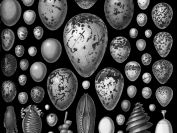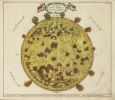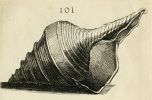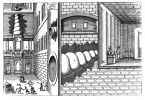To illustrate his belief in the magnetic relationship between the sun and the vegetable kingdom, Kircher designed this heliotropic sunflower clock by attaching a sunflower to a cork and floating it in a reservoir of water. As the blossom rotated to face the sun, a pointer through its center indicated the time on the inner side of a suspended ring. Kircher claimed that it didn't work well because enclosing it in a glass case would block the sun's attractive force, and that it was 'therefore susceptible to inaccuracies due to the wind'. Further, "when the sunlight was weak, and itself was as if withered and worn out, it ran slow, seeking rest." Descartes misread Magnes, interpreting Kircher's descriptions as referring to one of his earlier speculations attributing heliotropic timekeeping properties to a sunflower seed floating in a marked cup. Although Kircher was, in fact, describing experiments with other heliotropic plant matter, Descartes seized on his own misinterpretation to launch a vituperative attack on Kircher's scientific abilities, referring to the gentle Jesuit as 'possessed of an aberrant imagination' and 'more quacksalver than savant'. Descartes' authority in the developing scientific community was such that Kircher's reputation was to suffer irreparable damage as a result. Even Kircher's longtime supporter Peiresc became suspicious. Nevertheless, Kircher regularly maintained a version of his sunflower clock in his museum, modifying it occasionally and demonstrating its accurate functioning on more than one occasion. From Magnes, "Added to this is the fact that a clock of this sort can barely last one month, even though cared for with the greatest effort; thus nothing is perfect in every aspect."
from: Magnes, sive de arte Magnetica
(Rome, 1641)
Tropisms are typically associated with plants (although not necessarily restricted to them). Where an organism is capable of directed physical movement (motility), movement or activity in response to a specific stimulus is more likely to be regarded by behaviorists as a taxis (directional response) or a kinesis (non-directional response).










